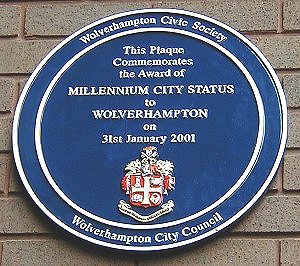Civic Pride
The heyday of civic pride in the UK was the 19th century when the urban towns experienced massive growth in their populations as a result of the industrial revolution. Civic pride motivated the citizens to build some of the greatest buildings in the country today such as town halls, libraries, art galleries and museums as well as beautiful urban parks, while at the same time introducing measures to improve the health and quality of life of its poorest inhabitants.
Leading citizens of these growing towns felt aggrieved that even though they had large populations they did not have their own local councils, so the first step was to get one (known as incorporation). This was then followed by getting city status for the town, via the new council, and the title of Lord Mayor for the chief citizen. Both honours could only be granted by the monarch following advice from the Home Secretary and was first started by Queen Victoria. Today the advice to the monarch comes from the Lord Chancellor and the honours are awarded at important times such as the monarch's jubilee.
 In the 1540's Henry VIII ensured
that only towns with
cathedrals were recognised as cities and this gave them massive civic pride.
The new industrial towns did not have cathedrals and could only get one if the
Bishops of the Church of England split up their administrative areas
(called dioceses) and made the town the headquarters of the new area. This
became difficult to do and eventually Belfast became the first city in the UK
to be granted city status without having a cathedral in 1888, and Southwell
became the first town with a cathedral not to be automatically given city status in 1884.
In the 1540's Henry VIII ensured
that only towns with
cathedrals were recognised as cities and this gave them massive civic pride.
The new industrial towns did not have cathedrals and could only get one if the
Bishops of the Church of England split up their administrative areas
(called dioceses) and made the town the headquarters of the new area. This
became difficult to do and eventually Belfast became the first city in the UK
to be granted city status without having a cathedral in 1888, and Southwell
became the first town with a cathedral not to be automatically given city status in 1884.
The 19th century inhabitants of the provincial towns decided they wanted their own citizens to have the benefits of higher education like Oxford and Cambridge, and these had to be created by Royal Charters. This finally happened in the 1830's when the Universities of Durham and London became the first universities in England for around 600 years. From 1992 instead of university charters, new universities would be created by law and this allowed the old Polytechnics to achieve University status.
It was also in the 19th century that saw the founding of Football clubs which quickly became a focus of pride for the citizens of the towns where they were based when the English Football League was founded in 1888. The English Premier league was started in 1992, and calls have been made at various times to allow the Glasgow giants of Celtic and Rangers to join it. The newest focus for civic pride has been the Britain in Bloom competition which started in 1963 and is awarded to towns and cities across the UK who have taken the most active interest in caring for their local environment.
If you love your town why not join your Local History and/or Civic Society? These voluntary organisations meet on a regular basis to recall and discuss your towns heritage, history and buildings and to ensure these are protected and preserved forever and new developments are scrutinized. They welcome all new members and anyone can join.
Civic Pride Articles
Aberdeen - Civic Pride Certificates for Babies
How to recapture cities' civic pride - John Ezard